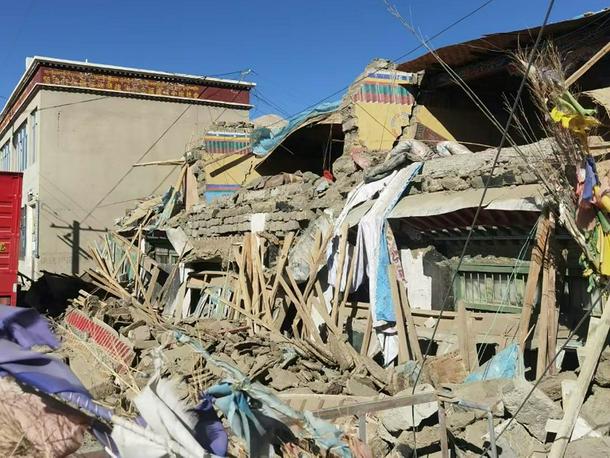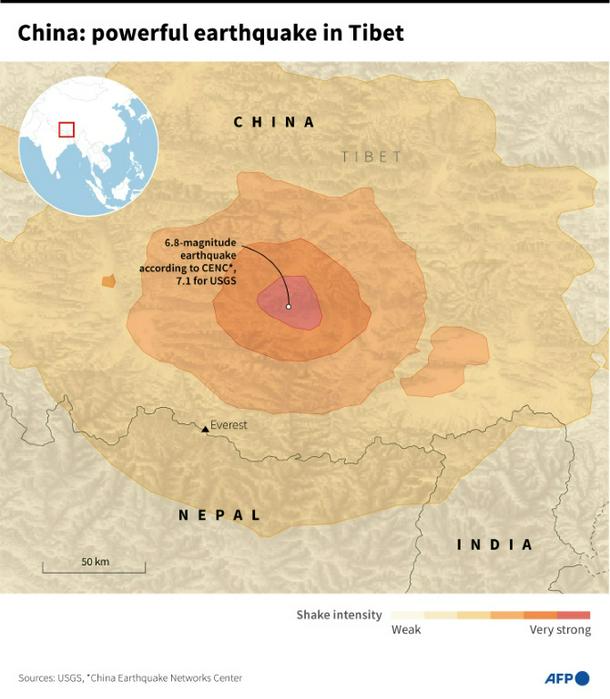
Houses in Tibet's Shigatse were collapsed by Tuesday's earthquake
Beijing (AFP) - Thousands of rescuers were searching for survivors in freezing conditions Wednesday after a devastating earthquake in China’s remote Tibet region killed at least 126 people.
Videos published by state broadcaster CCTV on Wednesday showed rescue workers pulling injured victims from the rubble of collapsed buildings and carrying them to safety.
Footage also showed a man in a dusty, thick winter coat carrying a crying child piggyback as a rescue worker draped a jacket over him.
Rescues were also seen setting up makeshift tents and examining the injured inside.
At least 126 people have been confirmed dead and 188 others injured in the Tuesday morning quake that struck rural, high-altitude Tingri county, about 80 kilometres (50 miles) north of Mount Everest near China’s border with Nepal.
Local officials said at a press conference on Wednesday afternoon that there had been no increases in the number of people killed or injured since the last update on Tuesday night.
More than 3,600 houses had collapsed due to the earthquake and 187 relocation sites have been set up, accommodating 46,500 people, said Hong Li, director of Tibet’s Emergency Management Department.
The affected region is a “high-altitude, cold plateau area with weak infrastructure such as transportation, communication, and electricity”, Hong said.
“The climate is cold, with large temperature differences between day and night, and low nighttime temperatures, making it difficult to maintain warmth and protect against the cold,” Hong said, adding that search and rescue efforts have transitioned to the resettlement of affected residents and post-disaster reconstruction.
The temperature in Tingri will drop to as low as minus 16 degrees Celsius (3.2 Fahrenheit) Thursday morning, according to the China Meteorological Administration. The county sits at an average altitude of 4,500 metres above sea level.

Map of the Tibet region in southwest China showing the shake intensity of an earthquake which occurred on Tuesday
Authorities earlier said more than 12,000 people, including firefighters, soldiers, police officers and professional rescuers, had been deployed, Xinhua reported.
Aid including tents, quilts and cold-weather equipment had been dispatched by central authorities, it added.
When tourist Meng Lingkang arrived in the town of Lhatse, 65 kilometres from the epicentre, he saw “the buildings had cracked open”.
“Some of the older houses collapsed, and a large part of the buildings made from bricks had cracked open, with big fissures,” the 23-year-old told AFP.
“There were quite a few (rescue vehicles). One after the other they arrived,” he added.
- ‘Profoundly saddened’ -
The China Earthquake Networks Center (CENC) measured the quake’s magnitude as 6.8, while the US Geological Survey reported it as 7.1.
The area most affected is surrounded by mountainous terrain on the Chinese side of Everest.
Tingri, the epicentre, is home to around 62,000 people and much less developed than urban centres like Tibet’s capital Lhasa.
Many of the fallen houses appeared constructed of traditional materials such as stone, mud bricks and wooden beams.
Chinese President Xi Jinping has called for “all-out search and rescue efforts”, CCTV said.
UN Secretary-General Antonio Guterres said he was “profoundly saddened” by the lives lost in the earthquake.
“The United Nations is closely monitoring the situation and stands ready to provide support if requested,” Guterres said in a statement.
French President Emmanuel Macron offered assistance to those affected, while Russian President Vladimir Putin and Japanese Prime Minister Shigeru Ishiba expressed their condolences.
Tingri is under the administration of the prefecture-level city of Shigatse, home to the traditional seat of the Panchen Lama, one of the most important spiritual figures in Tibetan Buddhism after the Dalai Lama.
The Dalai Lama said he was “deeply saddened”.
“I offer my prayers for those who have lost their lives and extend my wishes for a swift recovery to all who have been injured,” the exiled spiritual leader said in a statement.
AFP is unable to report from Tibet due to restrictions on foreign media.
Beijing imposes strict control on access to the Himalayan region, which it considers an inalienable part of its territory.
China took control of Tibet in 1951 before the Dalai Lama fled into exile in 1959.
Tibet had previously been largely autonomous, following the fall of the Qing dynasty which lasted three centuries.
- Most powerful -
In addition to capital Kathmandu, areas around Nepal’s Lobuche – in the high mountains near Everest – were also rattled by the tremor and aftershocks on Tuesday.
No injuries or deaths have been reported so far in the country or in India, where tremors were felt in Bihar state.
Tuesday’s quake was the most powerful recorded within a 200-kilometre radius in the last five years, the CENC said.
A quake in December 2023 in northwest China killed 148 people and displaced thousands in Gansu province.